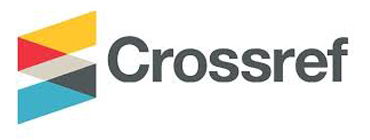THE USE OF ENCANTADO GAME TO DEVELOP STUDENTS’ SPEAKING SKILLS AT MTS SWASTA INSAN CITA
Abstract
The objective of the research was expected to describe the use of Encantado Game in developing students’ speaking skills. The subject of the research were the seventh grade students of MTs Swasta Insan Cita in 2020/2021 academic year. The seventh grade students of MTS Swasta Insan Cita consisted of 38 students. This research applied by Classroom Action Research. The data of the research were qualitative data and quantitative data. The quantitative data were taken from the test (in the form of Pre-Test, Post test 1 and Post test 2) which given in the end of of every cycle. While qualitative data were taken from Interview, Observation sheet, and dairy notes. The objective of the research was to describe the use of encantado game in developing students speaking skills of the seventh grade students of MTs Swasta Insan Cita Medan in academic year 2020/2021. The showed that encantado games can developed students’ speaking skills of the seventh grade. It can be seen from the results of Pre-test, Post Test I and Post Test II. In Pre-test the result showed that the mean score of students speaking skills was 61,07 (the precentage was
29 %, and 11 students who got successful), and Post test I can be seen that mean score of students speaking skills was 70,26 (the precentage was 50%, and 19 students who got successful), And the result of Post test II can be seen that mean score of students speaking skills was 70,84 (there was the precentage was 74 % and 28 students who got successful). And then the total number of seventh grade students of MTs Swasta Insan Cita was 38 students. In conclusion, students speaking skills was developed from Pre-test until Post Test II. Than it can indicates that using encantado game can develop students speaking skills.
Full Text:
PDFReferences
A. S Hornby. 2003. Oxford Advaced Learrner’s Dictionary. China: Oxford University Press.
A.L. Chaney. 2002. Teaching OralCommunication. Boston: Allyn and Bacon.
Ahmad Mustafa Al-Maraghi. Tafsir Al Maraghi. Al-Bayan. 2001. Alquran dan
Anas Sudijono. 2014. Pengantar Statistik Pendidikan. Jakarta: Raja Grafindo Persada.
Andrew Wright, David Betteridge, Michael Buckby. 2006. Games for Language Learning. UK: Cambridge University Press.
Brown, Hd. 2004. Language Assessment: Principles and Classroom Practice. New York; Pearson Education.
Brown. 2001. Teaching by Principles: An Interactive Language to Approach Pedagogy. San Francisco: Longman.
Burns. 2002. Collaborative Action Research for English Language Teacher. UK: Cambridge University Press.
Cooke, Nancy J. 2002. Varieties of Knowledge Elicitation Techniques. International Journal of Human-Computer Studies. 41.
Donal, Ary. 2002. Introduction to Research in Education (8th edition). Canada: Wardsworth. Cengange Learning.
Feraz Hamza. 2007. Tafsir al Jalalayn. Jordan :Royal Aal Al Bayt Institute For Islamic Thought.
Finocchiaro, M and Sako, S. 2002. Foreign Language Testing: A Practical Approach to Language Pedagogy. San Fransisco: Prentice Hall.
Fithriani, R., 2017. “Indonesian Students’ Perception of Written Feedback in Second Language Writing”. Doctoral Dissertation, retrieved from https://digitalrepository.un.med/educ_liss_et ds/87
Grauberg, Walter. 2002. The Elements of Foreign Language Teaching. Clevedon: Multilingual Matters. Ltd.
H.Douglas Brown. 2001. Teaching by Principles: an Interactive Approach to Languge Pedagogy Second Edition. New York: Pearson Education Inc.
Harmer, J. 2001. The Practice of English Language Teaching (3rd Edition). London: Longman Group Ltd.
Harmer, J. 2007. The Practice of English Language Teaching (4rd Edition). London: Longman Group Ltd.
Hasan Asari (ed). 2008. Hadis-Hadis Pendidikan. Bandung: Citapustaka Media Perintis, p.318.
http://en.oxforddictionaries.com accessed on Sunday, 15th March, 2020 at 7.18 pmJack C. Richards. 2008. Teaching Listening and Speaking; From Theory to Practice. New York: Cambridge University Press.
Jack C. Richards. 2006. Communicative Language Teaching Today. Cambridge : Cambridge University Press.
Kemmis, S., McTaggart, R. 2002. The Action Research Reader. Victoria: Deakin University.
Koponen, M. 2004.”Let Your Language and Thoughts Flow! Is There A Case For‟Fluency‟ in ELT and Applied Linguistic?” Insari Louma, Assesing Speaking. New York: Cambridge University Press.
M.Djunaidi Ghory. 2008. Penelitian Tindakan Kelas. Malang: UIN Malang Press.
Mahsun, 2005. Metode Penelitian Bahasa Tahapan Strategi, Metode, dan Tekhniknya. Jakarta: PT. Raja Grafindo Persada.
Martinson, Barbara, and Sauman Chu. 2008. “Impact of Learning Style on Achievement When Using Course Content Delivered Via a Game-based Learning Object.” In Handbook of Research on Effective Electronic Gaming in Education, edited by R. E. Ferdig, 478-488, Pennsylvania: IGI Global.
Meriam Webster. Online Dictionary. www.meriam-webster.com accesed on March 09, 2020
Miles, Mathew B. 2002. Qualitative Data Analysis. United State of America: SAGE Publication.
P.N. Parashar. 2006. Spoken English, New Delhi: Ajay Verma for Common Wealth Publishers.
Riyaz Ahmad. 2016. Importance of English Communication Skills Journal, Sreenivasa Institute of Technology and Management Studies. Chittoor: Andhra.
Rochiati Wiriaatmadja. 2014. Metode Penelitian Tindakan Kelas. Bandung: PT Remaja Rosdakarya.
Sanggam Siahaan. 2008. The EnglishParagraph. Yogyakarta: Graha Ilmu.
Scott Thornbury. 2002. How to TeachSpeaking. London: Longman.
Shenton, K.Andrew. 2005. Strategies for Ensuring Trustworthiness in Qualitative Research Project. Education for Information: Northumberia University.
Solihatul Hamidah Daulay. 2011. Introduction to General Linguistics. Medan: La-Tansa press.
Suharsimi Arikunto. 2010. Prosedur Penelitian: Suatu Pendekatan Praktik. Jakarta: Rineka Cipta.
Talak-Kiryk, Amy. 2010. Using Games in a Foreign Language Classroom. MA TESOL Collection Paper 484.
Terjemahannya. Semarang: Asy syifa.
Refbacks
- There are currently no refbacks.

This work is licensed under a Creative Commons Attribution-NonCommercial-ShareAlike 4.0 International License.
INDEXING
Bright Vision by UIN Sumatera Utara Medan is licensed under a Creative Commons Attribution-NonCommercial-ShareAlike 4.0 International License.
Based on a work at http://jurnaltarbiyah.uinsu.ac.id/index.php/brightvision.









